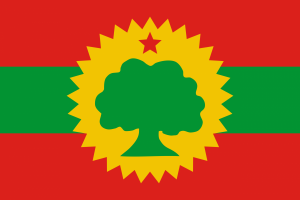Language/Borana-arsi-guji-oromo/Grammar/Personal-Pronouns
| ◀️ Singular and Plural Nouns — Previous Lesson | Next Lesson — Numbers 1-20 ▶️ |
Personal pronouns are an important part of any language, as they allow speakers to refer to themselves and others without having to constantly repeat names or nouns. In Borana-Arsi-Guji Oromo, personal pronouns are used in a variety of contexts, from subject and object pronouns to possessive pronouns.
Subject Pronouns
Subject pronouns are used to indicate the person or people performing the action of a sentence. In English, subject pronouns include "I", "you", "he", "she", "it", "we", and "they". In Borana-Arsi-Guji Oromo, subject pronouns are as follows:
| Borana-Arsi-Guji Oromo | Pronunciation | English |
|---|---|---|
| Ani | ɑni | I |
| Anti | ɑnti | You (singular) |
| Antiin | ɑntiːn | You (plural) |
| Isa | isɑ | He |
| Isaati | isɑːti | She |
| Isaana | isɑːnɑ | It |
| Inni | inni | We |
| Inniin | inniːn | We (exclusive, more than two people) |
| Innin | innin | We (inclusive, more than two people) |
| Isaawaa | isɑːwɑː | They (masculine or mixed) |
| Isiyn | isiːn | They (feminine) |
Example: Ani lubbuu ittiin dabaruu. (I speak with you.)
Object Pronouns
Object pronouns are used to indicate the person or people receiving the action of a sentence. In English, object pronouns include "me", "you", "him", "her", "it", "us", and "them". In Borana-Arsi-Guji Oromo, object pronouns are as follows:
| Borana-Arsi-Guji Oromo | Pronunciation | English |
|---|---|---|
| Mi | mi | Me |
| Lakka | lɑkkɑ | You (singular) |
| Lakkiin | lɑkkiːn | You (plural) |
| Hunddaa | hunddɑː | Him |
| Harka | hɑrkɑ | Her |
| Unkwa | unkʷɑ | It |
| Nu | nu | Us |
| Nuun | nuːn | Us (exclusive, more than two people) |
| Namoonni | nɑmoːnni | Us (inclusive, more than two people) |
| Iyyeefii | ijjɛːfi | Them (masculine or mixed) |
| Ihumeeffannaa | ihumeeffɑnnɑː | Them (feminine) |
Example: Ani lubbuu lakkaa marqaa harka dheeressanii hundi sobuu miti. (I speak with you while she is watching him with a smile.)
Possessive Pronouns
Possessive pronouns are used to indicate ownership or possession. In English, possessive pronouns include "mine", "yours", "his", "hers", "its", "ours", and "theirs". In Borana-Arsi-Guji Oromo, possessive pronouns are as follows:
| Borana-Arsi-Guji Oromo | Pronunciation | English |
|---|---|---|
| Aniinbe | ɑniːnbe | Mine |
| Lakkambee / Lakkambici | lɑkkɑmbɛː / lɑkkɑmbɛːti | Yours |
| Isaana / Isaatii | isɑːnɑː / isɑːtiː / | His / Hers / Its |
| Inninbe | inninbe | Ours |
| Isaawabe / Isiynbe | isɑːwɑbɛː / isiːnbe | Theirs |
Example: Isaanbe dhiira bira dhoksuu danda’u. (It is mine, I found it in the forest.)
Exercises
- Translate the following sentences to Borana-Arsi-Guji Oromo:
1. I am happy. 2. She sees him. 3. We love you. 4. They are singing a song.
- Translate the following sentences to English:
1. Isaani jirra. 2. Antinin maali? 3. Mi kunkee itti fufaa. 4. Inninbeen bira hin soban.
Conclusion
In this lesson, you have learned about personal pronouns in Borana-Arsi-Guji Oromo, including subject, object, and possessive pronouns. These pronouns are essential for basic communication in any language, and with practice, you will become more comfortable using them in different contexts. Keep up the good work!
Other Lessons
- Alphabet and Pronunciation
- Negation
- Give your Opinion
- Past Tense
- How to Use Have
- 0 to A1 Course
- Adjectives
- Future Tense
- Plurals
Template:Borana-arsi-guji-oromo-Page-Bottom
| ◀️ Singular and Plural Nouns — Previous Lesson | Next Lesson — Numbers 1-20 ▶️ |

